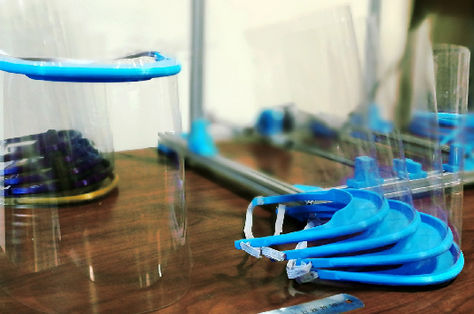
EBRD and EU4Business help AugmentAR look to the future
Just a few years ago, 3D printing belonged more to industrial settings than to people’s homes. The rapid evolution of the field and the growth of the market mean that 3D printers are now available at affordable prices to consumers, so everyone can create their own kitchen utensils, toys and DIY tools.
In Armenia, the AugmentAR team, which is supported by the EBRD and the European Union‘s EU4Business initiative through the Advice for Small Businesses programme, is one of the local pioneers of the three-dimensional printing trend.
Ingenuity being a trademark of the business, CEO and software engineer Arthur Khojabaghyan and his team were not discouraged when the coronavirus pandemic hit the country. Instead, they started considering how to make the best out of a very challenging situation, and not only for their business.
Their initial thought was that people can create and replace objects from the safety of their homes during a lockdown or quarantine. The 3D printers the company produces are an excellent solution for the current ‘stay-at-home’ lifestyle. With such a printer, if an item is missing or something breaks, one simply has to download a file from the internet and make another without leaving the house.
“Covid-19 has made us increasingly aware of the possibilities provided by 3D printing. This will surely foster more demand in the market and accelerate the development of the sector. Our objective is to rapidly strengthen our brand and its recognition, and put our efforts into export. At the same time, we believe that more people in Armenia will start buying 3D printers. We already registered higher sale figures” says Mr Khojabaghyan.
AugmentAR provides free tutorials in 3D printing and suggestions for creations on its online platforms, including social media. Educating people about 3D printing is important for the company, which employs 21 young engineers. Its strategy is to involve children and school students in specific learning programmes. They cooperate with Armath Engineering Laboratories, a national extracurricular education programme for the promotion of science, technology, engineering and mathematics in high schools. AugmentAR invented an educational printer which ‘self-replicates’ and prints out a new 3D printer, with the dual purpose of teaching each student how to use the machine and providing one for themself.
Some 575 schools in Armenia make use of this training. At present, schools are closed, but in a project financed partly by the EU and partly by AugmentAR, the EBRD has selected a business consultant to work with AugmentAR to promote these activities and expand them to 700 more schools across the country and beyond.
But right now, there’s an even more pressing issue that can be partly solved with 3D printing: the lack of sufficient personal protective equipment and, in particular, of special protective glasses and face shields, which doctors and nurses need to use in special Covid-19 hospital wards or when tending to patients in isolation.
Mr Khojabaghyan wasted no time in searching through open source blueprints for coronavirus-related medical supplies. Engineers have made available details of a face shield model which can be printed out and save lives. Meanwhile, the Faculty of Pharmacy at the Yerevan State Medical University reached out to AugmentAR for collaboration and sent over samples of shields and glasses. With careful and successful experimentation, AugmentAR produced supplies which were sent back and approved.
“We could not be indifferent to what was happening and we began to study and experiment with different methods. This allowed us to quickly find and employ effective means. We also shared our experience so that others who have 3D printers can participate. Armath Labs joined the project with its full capacity. We believe that, to some extent, we all played a modest role in alleviating the spread of the infection,” says Mr Khojabaghyan.
With the details available online and in cooperation with Armath, other laboratories started printing away. So far, over 4,000 masks and glasses have been produced and donated to 50 hospitals around the country.
The success has clearly inspired the company and its employees. They are now working on designing files to print out artificial respiration devices.
“The European Union remains committed to supporting SMEs and creating jobs in Armenia in response to the Covid-19 crisis. With Team Europe partners like the EBRD, the EU continues to stand by Armenian entrepreneurs, promoting business opportunities and innovation in these challenging times,” said the EU Ambassador to Armenia, Andrea Wiktorin.
“The EBRD is very proud of the prompt response of many small businesses we support with funding from the European Union in rising up to the coronavirus challenge,” said Dimitri Gvindadze, the EBRD’s Head of Armenia.
